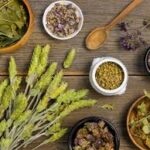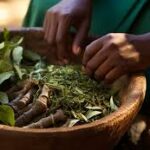Herbs and the Immune System: Boost or Risk?

The immune system is the body’s natural defense against infections and diseases. In Africa, traditional medicine has long relied on herbs to strengthen immunity and support overall wellness. From ginger and garlic to moringa and neem, these natural remedies are used to prevent illness and speed up recovery. However, while many herbs can boost the immune system, misuse or overuse may pose health risks. This article explores the benefits and dangers of using African herbs for immunity.
Common African Herbs for Immunity
1. Moringa
Rich in vitamins A, C, and E, moringa helps fight oxidative stress and strengthens the immune response.
Risk: Excessive intake may cause digestive upset.
2. Ginger
Widely used in African households, ginger has anti-inflammatory and antimicrobial properties that help the body ward off infections.
Risk: Overconsumption may cause heartburn or blood thinning.
3. Garlic
Garlic contains allicin, a compound that boosts immune function and lowers the risk of infections.
Risk: High doses may irritate the stomach and interfere with blood pressure medications.
4. Neem (Dongoyaro)
Known for its detoxifying properties, neem is used to cleanse the system and fight bacteria and viruses.
Risk: Overuse can harm the liver and reduce fertility.
5. Baobab Fruit
Baobab is a superfood rich in vitamin C, which supports the body’s production of white blood cells.
Risk: Excess consumption may lead to diarrhea.
Benefits of Herbs for the Immune System
-
Prevent Infections – Herbs like garlic and ginger fight viruses and bacteria naturally.
-
Antioxidant Protection – Moringa and baobab reduce oxidative stress, slowing down cell damage.
-
Anti-inflammatory Effects – Herbs help regulate inflammation, which is key to immune balance.
-
Affordable Health Solutions – Many herbs are locally grown, making them accessible and cost-effective for African communities.
Risks and Challenges
While herbs can strengthen the immune system, risks include:
-
Overstimulation – Excessive immune boosting may trigger autoimmune reactions.
-
Drug Interactions – Garlic, ginger, and neem may interact with blood thinners, diabetes drugs, or contraceptives.
-
Unregulated Market – Herbs are often sold without dosage instructions, leading to unsafe use.
-
False Security – Relying only on herbs may prevent people from seeking medical care when needed.
Safe Use Recommendations
-
Use herbs in moderation and as part of a balanced diet.
-
Consult healthcare providers if taking medications alongside herbs.
-
Buy from reliable sources to avoid adulterated or contaminated products.
-
Combine herbs with lifestyle habits such as exercise, good nutrition, and adequate sleep.
Conclusion
African herbs play a significant role in boosting immunity, helping the body defend against infections, and promoting overall health. However, while powerful, they are not without risks. Overuse, unsafe combinations, and lack of regulation can turn these natural remedies into health threats.
The safest approach is to combine herbal wisdom with modern medical guidance. By doing so, African communities can enjoy the immune-boosting power of herbs while minimizing the dangers.
Written by Fawzi Rufai, Medically Reviewed by Sesan Kareem



